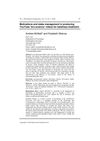 July 2021 in “IntechOpen eBooks”
July 2021 in “IntechOpen eBooks” Ginseng, especially its component ginsenosides, can promote hair growth, reduce hair loss, and potentially treat conditions like alopecia by affecting cell pathways and cytokines.
 1 citations,
January 2018 in “International Journal of Web Based Communities”
1 citations,
January 2018 in “International Journal of Web Based Communities” Creators of YouTube 'bro-science' baldness videos are driven by a need to share and persuade, often emphasizing authenticity and community building, while navigating trust issues related to commercial ties.
 3 citations,
April 2022 in “Clinical, Cosmetic and Investigational Dermatology”
3 citations,
April 2022 in “Clinical, Cosmetic and Investigational Dermatology” Different methods, including stress management, healthy diet, supplements, and treatments like minoxidil, can help hair grow back after COVID-19 related hair loss.
 2 citations,
January 2019 in “International Journal of Case Reports and Images”
2 citations,
January 2019 in “International Journal of Case Reports and Images” The hair growth solution reduced hair loss and increased hair thickness in a small group of patients.
 19 citations,
January 2019 in “International Journal of Trichology”
19 citations,
January 2019 in “International Journal of Trichology” Indian dermatologists recommend treating common hair loss with a balanced diet, stress reduction, mild shampoos, and sometimes minoxidil and supplements.
 7 citations,
October 2020 in “Dermatology practical & conceptual”
7 citations,
October 2020 in “Dermatology practical & conceptual” Some skin, hair, and nail supplements can be toxic, interact with medications, affect lab tests, and may increase cancer risk.
3 citations,
January 2021 in “Molecular genetics & genomic medicine” The study found two new mutations in a Chinese patient with severe biotinidase deficiency.
 October 2023 in “Current Issues in Molecular Biology”
October 2023 in “Current Issues in Molecular Biology” The YH complex, made from Astragalus membranaceus and Cinnamomum cassia, may help treat hair loss by promoting hair growth and follicle development.
 November 2022 in “Journal of clinical images and medical case reports”
November 2022 in “Journal of clinical images and medical case reports” COVID-19 can cause hair loss in both severe and mild cases, often affecting women.
550 citations,
December 2005 in “The Journal of clinical investigation/The journal of clinical investigation” Researchers successfully isolated and identified key markers of stem cell-enriched human hair follicle bulge cells.
 9 citations,
July 2022 in “EMBO molecular medicine”
9 citations,
July 2022 in “EMBO molecular medicine” Blocking certain immune signals can reduce skin damage from radiation therapy.
 7 citations,
September 2022 in “Communications biology”
7 citations,
September 2022 in “Communications biology” Omega-6 fats in certain cells boost male hormone production.
 3 citations,
May 2018 in “Journal of nutritional health & food science”
3 citations,
May 2018 in “Journal of nutritional health & food science” Nutritional supplements can help manage hair loss and promote hair growth by strengthening hair roots and countering harmful effects of pollution, smoking, and deficiencies in vitamins and minerals.
2 citations,
July 2021 in “Actas dermo-sifiliográficas/Actas dermo-sifiliográficas” Hair shaft disorders are diagnosed through examination and history, with general care and some treatments offering improvement.
 2 citations,
December 2019 in “Cureus”
2 citations,
December 2019 in “Cureus” A patient with a scalp condition and benign skin tumor experienced hair loss and did not improve with treatment, choosing not to have surgery despite a small cancer risk.
 March 2024 in “Clinical, cosmetic and investigational dermatology”
March 2024 in “Clinical, cosmetic and investigational dermatology” Skin Radiance Collagen improved skin and hair health in adult females.
 November 2023 in “Skin appendage disorders”
November 2023 in “Skin appendage disorders” Public interest in oral minoxidil for hair loss increased after a New York Times article.
61 citations,
January 2011 in “PloS one” Notch signaling is essential for healthy skin and hair follicle maintenance.
12 citations,
May 2015 in “Journal of the National Comprehensive Cancer Network” Doctors should actively prevent and treat skin side effects in cancer patients to keep them on the best medication and reduce discomfort.
11 citations,
January 2018 in “International journal of trichology” Valproate can cause hair loss and changes in hair appearance, but may help regrow hair when applied topically.
 7 citations,
August 2021 in “Heliyon”
7 citations,
August 2021 in “Heliyon” Phyllotex™ extract was found to significantly promote hair growth and protect against hair loss.
5 citations,
April 2022 in “Pharmaceutics” Minoxidil nanoparticles significantly boost hair growth in mice compared to regular minoxidil.
 4 citations,
January 2023 in “Frontiers in Medicine”
4 citations,
January 2023 in “Frontiers in Medicine” Zinc is important for skin health, and supplements can help treat various skin and hair disorders, but more research is needed for conditions like psoriasis and vitiligo.
 4 citations,
August 2022 in “The Scientific World Journal”
4 citations,
August 2022 in “The Scientific World Journal” Merremia peltata leaf extract, particularly the bufotalinin compound, shows potential for treating hair loss.
 1 citations,
April 2023 in “Biomolecules”
1 citations,
April 2023 in “Biomolecules” Fermented papaya and mangosteen in hair care products helped prevent hair loss and improve hair thickness.
 1 citations,
January 2022 in “Faculty reviews”
1 citations,
January 2022 in “Faculty reviews” The best long-lasting results in treating hair loss may be achieved through combination therapy, including treatments like finasteride, minoxidil, and platelet-rich plasma injections.
 1 citations,
August 2017 in “Journal of food and nutrition research”
1 citations,
August 2017 in “Journal of food and nutrition research” The herbal supplement increased hair thickness and reduced scalp oiliness in women.
 November 2024 in “Applied Sciences”
November 2024 in “Applied Sciences” Placenta products might help with hair loss, but more research is needed.
 August 2024 in “Cosmetics”
August 2024 in “Cosmetics” Caffeine is beneficial for skin and hair treatments but needs better delivery methods to penetrate deeper skin layers.
 August 2024 in “Stem Cell Research & Therapy”
August 2024 in “Stem Cell Research & Therapy” New regenerative therapies show promise for treating hair loss.























